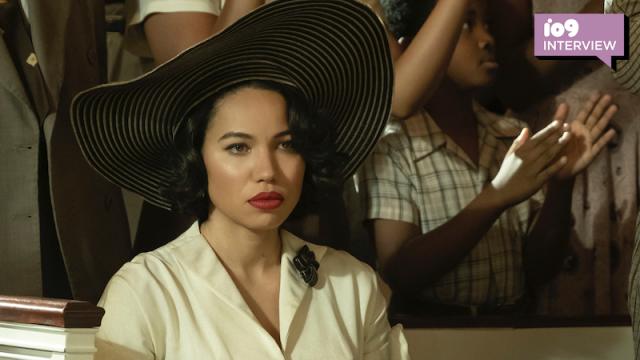In the third episode of HBO’s Lovecraft Country, the series shifts gears in an interesting way as its heroes settle back into their lives in Chicago, newly aware that somewhere in America, there are white supremacist magic users vying to take control of the world through occult means. It’s the sort of mental burden that would exhaust most people, but not Letitia Lewis.
“Holy Ghost” sees Letitia (Jurnee Smollett) mysteriously coming into a sizable inheritance from her late mother (who she was somewhat estranged from in life) that she uses to buy a massive mansion on the predominantly white North side of Chicago. While Leti’s sister Ruby sees the purchase as yet another one of Leti’s impulsive, self-serving decisions that’s only going to end up getting people hurt, Leti’s confident that she can transform the building into a Black-owned boarding house designed to serve the city’s population of young creatives and revolutionaries.
[referenced id=”1286991″ url=”https://gizmodo.com.au/2020/08/lovecraft-country-would-like-to-point-out-that-you-cant-eat-at-just-anybodys-house/” thumb=”https://gizmodo.com.au/wp-content/uploads/2020/08/24/mjkek9csg3gs43uyfb1i-300×169.jpg” title=”Lovecraft Country Would Like to Point Out that You Can’t Eat at Just Anybody’s House” excerpt=”Lovecraft Country understands that the best horror always allows for its heroes to make at least a few poor decisions in service of the plot.”]
Unsurprisingly to either of the sisters, Leti’s drive to open the boarding house turns out to be successful, and it isn’t long before boarders begin moving in and diversifying the neighbourhood in ways that the city’s redlining was explicitly designed to prevent. When the leers from white people escalate into outright attempts at intimidation and then culminate in a cross being burned on her property, not a single ounce of it causes Leti to falter visibly. Not only is she more than accustomed to having to deal with garden variety racists like the ones in her yard, but she’s also got other things on her mind: like the malevolent ghost of a racist serial killer that’s been haunting her and trying to drive her out of the house.
When we spoke with Smollett recently about her approach to embodying Leti, she explained that as strong an outward-facing presence as Leti’s had from scene to scene, she isn’t just a no-nonsense monster and ghost hunter in the making. Part of her complexity is tied to the fact that she’s vulnerable, something Smollett pointed out is a trait that Black women characters are seldom allowed to have.
“Everyone always expects us to be strong and that’s not true,” Smollett said. “That’s false. With Leti, it was very important to explore her vulnerability, to explore her fears, to explore this lineage of trauma she’s inherited, to explore what it’s like when someone is habitually abandoned by their mother.”
Smollett added that for all of the time and energy that Leti spent trying to put distance between herself and her mother, it’s undeniable that she takes after her in a number of ways that Leti might not be fully aware of. Rebellious as she may be perceived as by her peers when she’s staring down bigots and daring them to come fight her, Smollett reasons that everything about her character ties back to a deep desire to push back against the erasure of Black people in various spaces.

Though the idea of being haunted by a racist ghost sounds ridiculous on its face, it doesn’t exactly faze Leti — in part because of her familiarity with sci-fi and fantasy from the time she spent reading it growing up (not to mention what she just experienced with Atticus). Smollett reasons that, in a way, by broadening the horizons of her imagination, Leti put herself at an advantage both to deal with the supernatural and to make sense of the more “real” world we’re all familiar with.
“I would argue that being a part of the Southside Science Fiction Club as a kid helped her dream, you know, helped her see the world in a bigger way,” Smollett said. “She’s seen other parts of the country that are ugly, but also beautiful. In an era when the erasure of Black folks was so prevalent, she picks up a camera like Gordon Parks.”
Leti’s cavalier approach to life has only served her well thus far, and there doesn’t seem to be much of a reason for her to switch things up anytime soon. But with Lovecraft Country, things tend to go real sideways real quick, meaning that before the season’s over, Leti might just have to zig where she might normally zag.
Lovecraft Country airs on Sundays on HBO.
[referenced id=”1247112″ url=”https://gizmodo.com.au/2020/08/lovecraft-countrys-misha-green-explains-how-the-horrors-to-come-are-bigger-than-magic-and-monsters/” thumb=”https://gizmodo.com.au/wp-content/uploads/2020/07/25/wgcvp3hasocaku3kvxm6-300×166.jpg” title=”Lovecraft Country’s Misha Green Explains How the Horrors to Come Are Bigger Than Magic and Monsters” excerpt=”Like all horror that wants to leave you feeling unsettled and disturbed long after you’ve finished watching it, Lovecraft Country’s first episode is careful to take its time and make you wait almost until the very end for the series’ supernatural monstrosities to make themselves known. If anything, the demons…”]For more, make sure you’re following us on our Instagram @io9dotcom.
Editor’s Note: Release dates within this article are based in the U.S., but will be updated with local Australian dates as soon as we know more.
